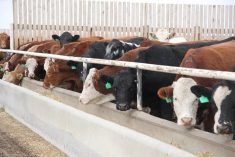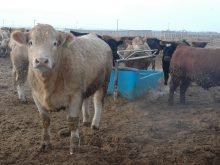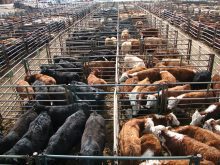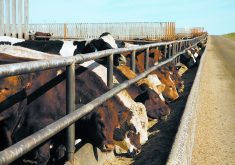This cattle market information is selected from the weekly report from Canfax, a division of the Canadian Cattlemen’s Association. More market information, analysis and statistics are available by becoming a Canfax subscriber by calling 403-275-5110 or at www.canfax.ca.
Fed prices hold steady
Alberta direct cattle sales saw active cash trade last week with prices fully steady with the previous week. The majority of weekly trade was reported July 15, dressed from $223-$225 per hundredweight delivered.
Read Also

Critical growing season is ahead for soybeans
What the weather turns out to be in the United States is going to have a significant impact on Canadian producers’ prices
Although weighted average prices trended steady, the nearby August live cattle contract rallied $4 per cwt. higher and the Alberta cash to futures basis weakened from par two weeks ago to -3.45 per cwt. last week. A handful of live trade was reported steady with last week and comparable with rail sales.
Western Canadian fed slaughter for the week ending July 11 was the largest weekly fed kill so far this year at 52,676 head and the largest since July 2005. Year-to-date western Canadian fed slaughter was down five percent from a year ago, totalling 1,001,349 head.
Western Canadian steer carcass weights for the same week were reported seven pounds larger than the previous week at 868 pounds and five lb. larger than the same week last year.
For the week ending July 4, the U.S. Department of Agriculture reports that Canadian fed cattle/cow exports were 14 percent lower than the previous week at 8,165 head and were 32 percent larger than year ago. Year-to-date fed cattle/cow exports are seven percent larger than a year ago, totalling 268,549 head.
U.S. cut- out values typically trend steady to modestly higher through the peak July-August grilling season. In contrast, fed prices seasonally ease lower through the third quarter on softer demand and ample market-ready supplies.
The Alberta fed steer five-year average price indicates prices softened three percent from July to August and declined an additional four percent from August to September. For the first three weeks of July, Alberta fed steer prices have averaged around $132.50 per cwt. Using historic assumptions, steer prices could ease to around $128 per cwt. by August and continue to decline to around $121.50 per cwt. for September. Fed slaughter is expected to return to a basic five-day kill.
In the United States there was moderate trade mid-week with live prices steady to $1 per cwt. higher than the previous week in the south from US$95-$97 per cwt. Live trade in the north was generally $1-$2 per cwt. higher than the previous week at $96-$98 per cwt., and dressed sales were reported fully steady to $3 per cwt. higher at $157-$160 per cwt. delivered.
Steer carcass weights for the week ending July 4 were steady with the previous week at 896 lb. and sharply 35 lb. larger than year ago. Last week’s total U.S. slaughter was estimated to be one percent smaller than the previous week and year ago at 650,000 head. Drought in some southern regions has flushed out a few more light stocker calves to market.
Butcher bulls in demand
Butcher cow prices traded steady to slightly lower through commercial auction facilities last week. D2s traded at $80-$97 per cwt. in the west to average $89.25. D3s traded at $70-$85, averaging $78.14. Butcher bulls averaged $119.68.
After trading at a discount to the U.S. utility cow market for most of June and early July, D2 cow prices have recently moved to a slight premium against the U.S. Butcher bull prices established new annual highs last week. U.S. packers continue to be a major push behind the Canadian bull market. Year-to-date, 75 percent of the bulls that have been marketed have been exported to the U.S.
Western Canadian cow slaughter for the week ending July 11 totalled 5,194 head, one percent lower than last year, the 16th consecutive week that cow slaughter volumes have been below year ago. Further price upside for the cow market is still expected over the next 30 days. Its possible D2 cow prices could surpass April highs of $92.80 per cwt. in August.
Light feeder volume
Calves and feeders traded mixed on a seasonally light offering last week. Despite lighter volumes, good demand continues to be noted on all classes of cattle.
Most of the bigger feeders on offer were coming out of background yards but a few grass cattle are starting to come to market. The few grass cattle being sold on the cash market are home-raised yearlings. Grass yearlings are trading at roughly $5-$10 per cwt. premium over feeders coming out of backgrounding lots.
With good grass conditions across much of the Prairies, some grass operators are considering doing a second turn of grass cattle by selling the heavy-end and buying back in on some light cattle and turning them out to grass. This could be one factor that has been and may continue to support the stocker market.
The Alberta feeder cash-to-futures basis weakened, going from -4.15 to -11.91 per cwt. last week. On a cash-to-cash basis, Alberta calf and feeder prices are still at a sizable premium to the U.S. market.
Canadian feeder exports to the U.S. for the week ending July 4 totalled 762 head, 56 percent lower than the same week last year. There has not been a single week this year that exports have been higher than last year.
For the month of May, Canadian feeder imports from the U.S. totalled 18,363 head, 31 percent larger than last year. In Western Canada demand for light calves does not seem to be moderating. Prices for good quality bull calves weighing from 450-550 lb. are comparable with same weight steer calves.
Last week cow-calf pairs traded from $1,700-$2,550 and averaged $2,115. Pairs are trading $145 higher than last year.
U.S. cutout drops
In U.S. beef trade, cut-out values have trended lower for nine straight weeks on ample offerings and softened demand. Choice cut-out value slipped US$2.75 per cwt. lower than the previous week to average $200.80 per cwt., and Select dipped $3.50 per cwt. lower to average $191.30 per cwt.
















